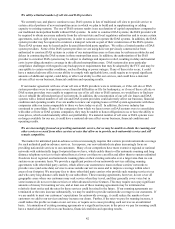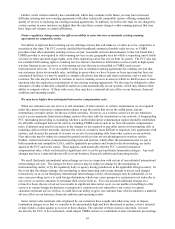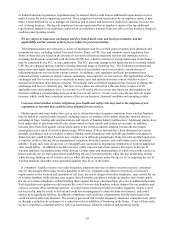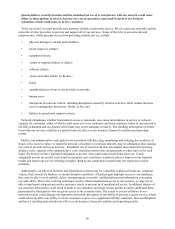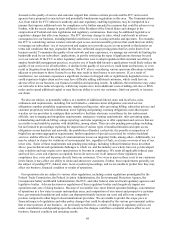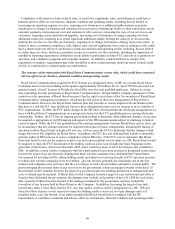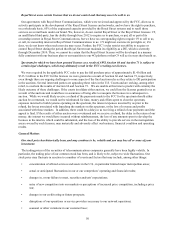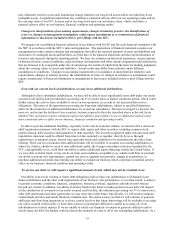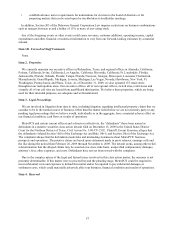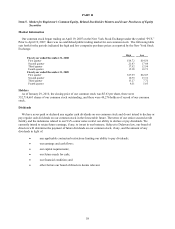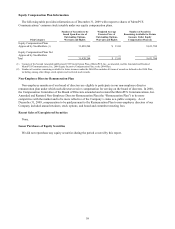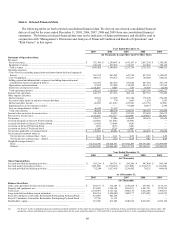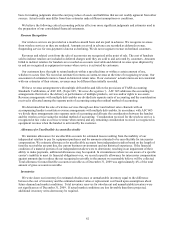Metro PCS 2009 Annual Report Download - page 64
Download and view the complete annual report
Please find page 64 of the 2009 Metro PCS annual report below. You can navigate through the pages in the report by either clicking on the pages listed below, or by using the keyword search tool below to find specific information within the annual report.52
to be determined at the time of any offering. If we propose to register any additional securities under the Securities
Act, either for our own account or for the account of security holders exercising registration rights, the number of
shares subject to registration could increase and your interest could be significantly diluted and the sale of these
shares may have a negative impact on the market price for our common stock. Further, the sale of a substantial
amount of our common stock, or the possibility of such a sale, including sales by significant stockholders or
executives of the Company, may reduce the market price of our common stock and could impede our ability to raise
future capital through the issuance of equity securities at a time and at a price we deem appropriate.
If we fail to manage our planned growth effectively and maintain an effective system of internal controls, we
may not be able to accurately report our financial results or prevent fraud.
We have experienced rapid growth and development in a relatively short period of time and expect to continue to
experience growth in the future. Effective internal controls are necessary for us to provide reliable financial reports
and effectively prevent fraud and to comply with Section 404 of the Sarbanes-Oxley Act of 2002, as amended, and
the rules and regulations of the SEC, collectively referred to as SOX. SOX requires us to furnish a report of
management’s assessment of the design and effectiveness of our internal control over financial reporting as part of
our Annual Report on Form 10-K filed with the SEC, and our management also is required to report on the
effectiveness of our disclosure controls and procedures. We regularly evaluate our internal controls, and our
independent auditors annually attest to our internal controls over financial reporting in compliance with SOX.
Material weaknesses could result in inaccurate financial statements or other disclosures or failure to prevent fraud.
Projections of any evaluation of effectiveness to future periods are subject to the risk that controls may become
inadequate because of changes in conditions or that the degree of compliance with the policies and procedures may
deteriorate. If we fail to maintain the adequacy of our internal controls, or to successfully remediate any material
weaknesses in a timely manner, we may not comply with SOX and our independent auditors would not be able to
certify as to the effectiveness of our internal controls over financial reporting and we could be subject to
investigations or sanctions by regulatory authorities or delisting from the NYSE. Further, any material weakness or
failure of our internal controls or the effectiveness of our internal controls could result in a restatement of our
financial statements. Inadequate internal controls also could harm our reputation, cause us to lose customers, or
cause investors to lose confidence in our reported financial information, which could have a negative effect on the
trading price of our stock, all of which could have a material adverse effect on our business, financial condition and
operating results. Any restatement of our financial statements could have adverse consequences, including the
triggering of an event of default under financing agreements, our credit rating could be downgraded, which could
result in an increase in our borrowing costs and make it more difficult to borrow funds on reasonable terms or at all,
the NYSE could begin delisting proceedings, and we could have stockholder litigation or SEC enforcement action,
all of which could have an adverse effect on our business, financial condition and operating results.
The value of our FCC licenses may drop in the future as a result of volatility in the marketplace and the sale of
additional spectrum by the FCC.
The market value of FCC licenses has been subject to significant volatility in the past and the value of our licenses
may continue to fluctuate based on market conditions, the availability of spectrum, whether through consolidation in
the industry, by FCC regulatory action or auction, the availability of buyers and sellers, and the inability to ascertain
the value of any license due to such volatility. The impact of the availability of spectrum from any future actions and
auctions on license values is uncertain. There can be no assurance of the market value of our FCC licenses or that
the market value of our FCC licenses will not be volatile in the future. If the value of our licenses was to decline
significantly, we could be forced to record non-cash impairment charges that could impact our ability to borrow
additional funds. A significant impairment loss could have a material adverse effect on our operating income and on
the carrying value of our licenses on our balance sheet, which could have a material adverse effect on our business,
financial condition and operating results.
Declines in our operating performance could ultimately result in an impairment of our indefinite-lived assets,
including FCC licenses, or our long-lived assets, including property and equipment.
We assess potential impairments to our long-lived assets, including property and equipment and certain intangible
assets, when there is evidence that events or changes in circumstances indicate that the carrying value may not be
recoverable. We assess potential impairments to indefinite-lived intangible assets, including FCC licenses, annually
and when there is evidence that events or changes in circumstances indicate that an impairment condition may exist.
The estimation of fair values or carrying values requires assumptions by management about factors that are highly
uncertain and possibly volatile, including future cash flow, stock prices, discount rates and other factors. If adverse
economic conditions, poor consumer confidence, reduced consumer spending, volatile and decreasing stock prices,
including our stock, continues for a period of time or we do not achieve our planned operating results, these factors


